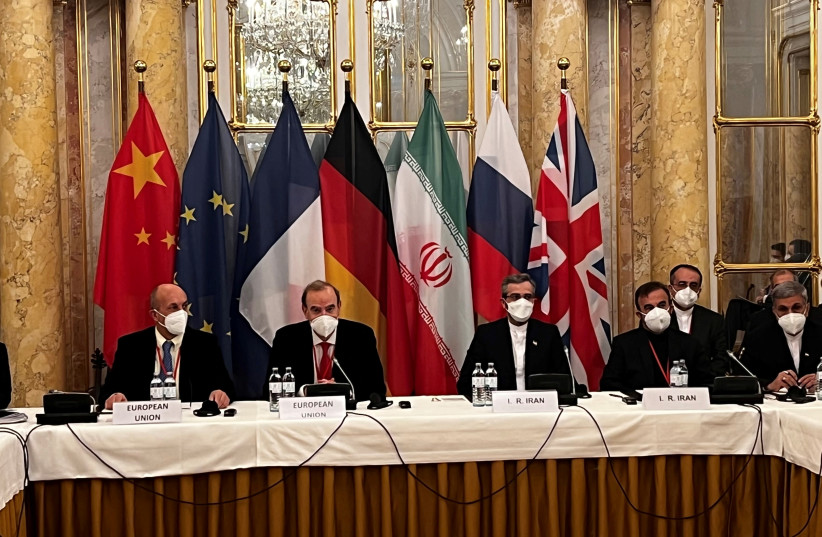When the incipient Biden administration originally spoke about negotiating with Iran, the key words were “longer and stronger,” implying that Secretary of State Antony Blinken sought a tougher Iran deal that would last past the 2015 Joint Comprehensive Plan of Action’s 2030 expiration date.
The goal was then quietly downgraded to putting Iran “back in the box,” meaning a return to compliance with the JCPOA. That agreement kept Iran a year from nuclear breakout by limiting Iran’s uranium enrichment to 3.67% purity and almost eliminating its stockpile of the fuel for a nuclear weapon, while gradually lifting sanctions on the regime.
Now, the US is aiming even lower than that.
Iran is currently enriching uranium to 60%, with some experts saying they are weeks away from weapons-grade 90%-enriched uranium. Weaponization – meaning, turning the fuel into a nuclear bomb – would take more time. But the JCPOA is focused on uranium, and any deal would, in theory, extend the time it takes Iran to reach 90% enrichment.
US officials concluded late last year that Iran had advanced its nuclear program too far to be kept a year away from breakout, The Wall Street Journal reported on Thursday.

That means that negotiations have been going on for over a month with the West knowing that Iran cannot be put back in the proverbial box, and a real return to the JCPOA – with its many shortcomings – is not possible.
When Blinken said earlier this month that “it’s really now a matter of weeks where we determine whether or not we can return to mutual compliance with the agreement,” the American assessment already was that they cannot, in fact, fully return to mutual compliance with the agreement.
When a senior State Department official briefed reporters this week saying, “We only have a handful of weeks left to get a deal, after which point it will, unfortunately, be no longer possible to return to the JCPOA and to recapture the nonproliferation benefits that the deal provided for us,” the official knew that they already would not be able “to recapture the nonproliferation benefits” in full.
Instead, the Journal says, the Biden administration is deliberating how short an Iranian breakout time they’re willing to tolerate, based on how much enriched uranium and related machinery Iran agrees to eliminate or seal in exchange for lifting most Trump-era sanctions.
IF BREAKOUT time is less than six months, it could enable Iran to quickly accelerate its nuclear program while impeding Washington’s response.
Plus, Iran’s expertise with advanced centrifuges – the deployment of which the JCPOA prohibited until 2026 – is something that cannot be rolled back. Iran has said over the last year’s negotiations that it will not agree to the destruction of its advanced centrifuges, which allow it to enrich uranium faster than with earlier-generation centrifuges.
The timing of the assessment that the flagship aim of the JCPOA cannot be attained appears to coincide with the departure of US Special Envoy for Iran Rob Malley’s deputy, Richard Nephew.
Nephew, a sanctions expert, departed over differences in approach with Malley, seeking a firmer American stance.
According to a report in the Journal earlier this month, one of the areas on which Nephew and Malley disagreed was the point at which Iran’s nuclear advancements render the JCPOA no longer relevant. In fact, Nephew thought the American team should have walked away from the talks in December, when Iran launched IR-6 advanced centrifuges at its underground facility in Fordow while refusing to negotiate from the point at which talks had left off in May.
The senior State Department official seemed to confirm the differences in opinion when asked about Nephew in his briefing this week, saying, “The team presents a wide range of policy options and arguments to the senior-most leadership of our government, but at the end of the day... the Iran team implements the policies that the president, secretary of state, the national security advisers and others in the cabinet have decided on. This is not a matter of person; it’s a matter of what the policy of the administration is.”
Senate Foreign Relations Committee Chairman Sen. Robert Menendez (D-New Jersey) expressed similar concerns this week, calling on the Biden administration to enforce existing US sanctions and encourage the EU to reimpose JCPOA sanctions, and come up with creative diplomatic initiatives and new strategies “for rolling back Iran’s nuclear program and addressing its dangerous and nefarious activities.”
“We are not dealing with a good-faith actor here,” Menendez said. “Iran’s consistent obfuscation, continual stalling and outlandish demands have left us flying blind, especially when it comes to verifying that Iran is not engaged in activities related to the weaponization process. I have yet to hear any parameters of ‘longer’ or ‘stronger’ terms or whether that is even a feasible prospect.”
Not only is Menendez right that a longer and stronger deal does not seem to be on the way, but every indication is that at this point, the US is negotiating a deal that is going to be shorter and weaker.
